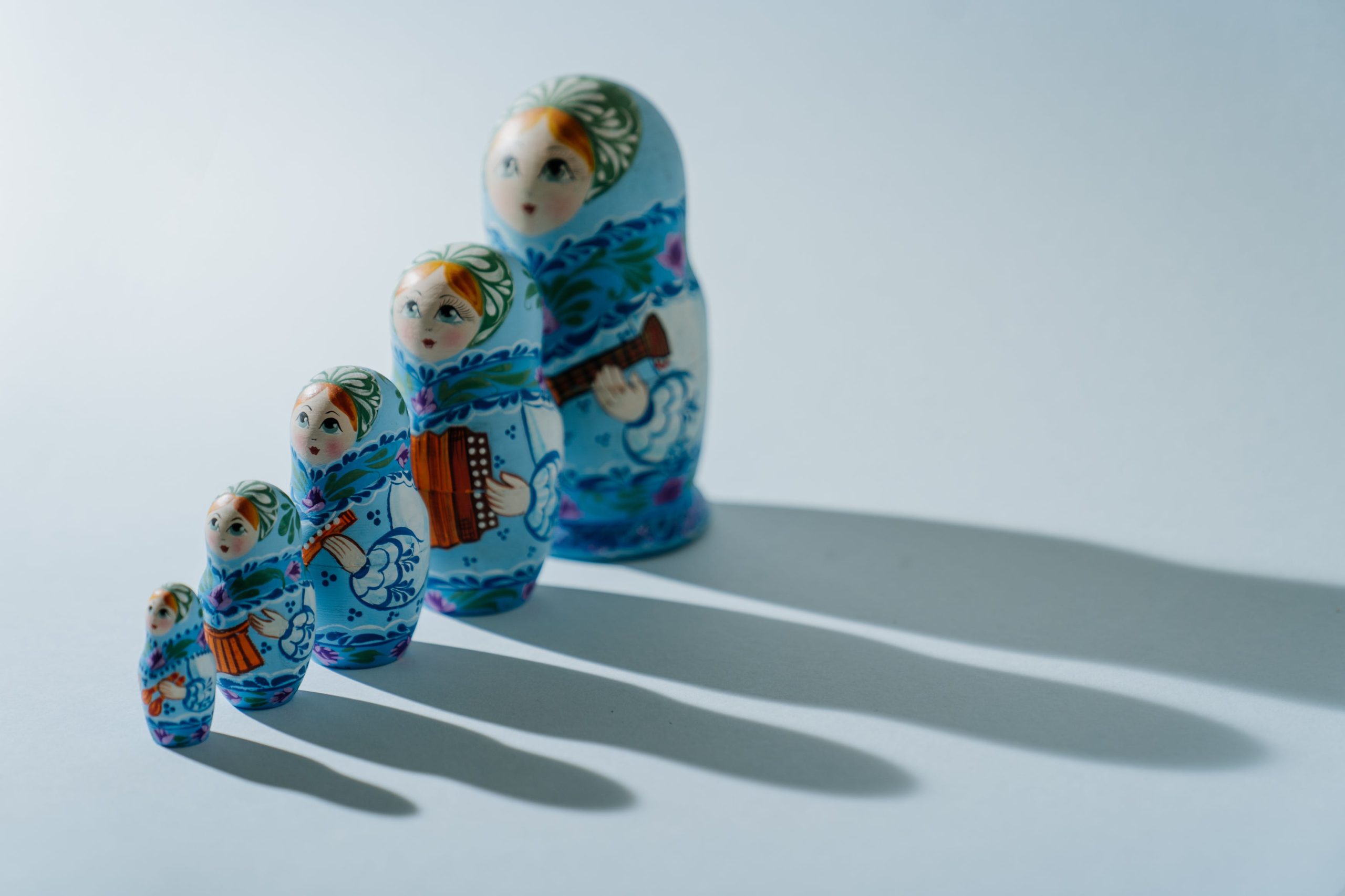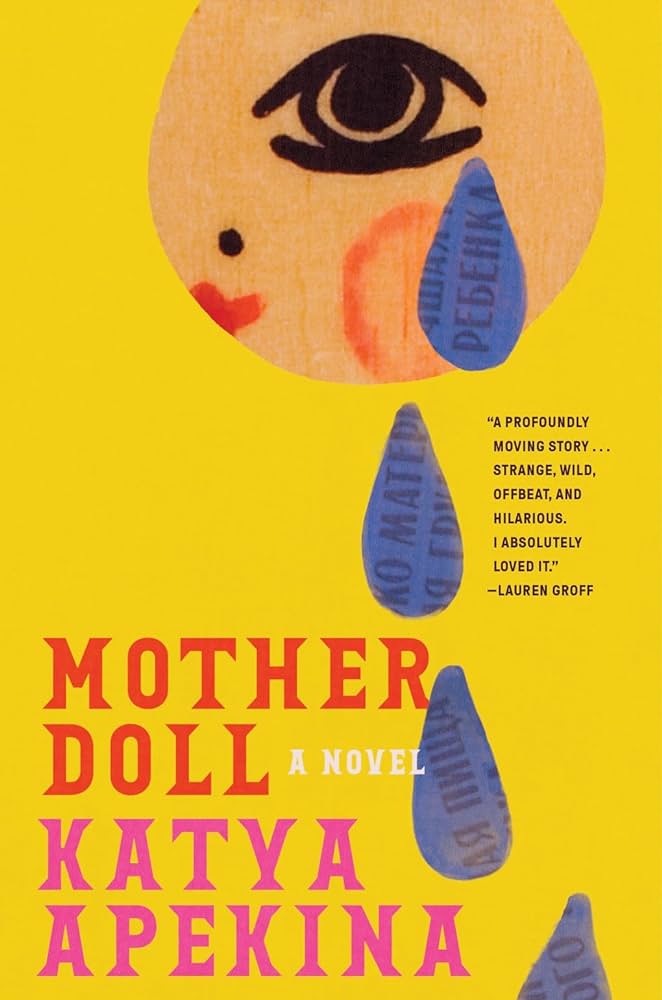Lit Mags
Pregnancy Is Turning Her Childfree Marriage Into a Russian Folktale
An excerpt from MOTHER DOLL by Katya Apekina, recommended by Sarah Rose Etter

Introduction by Sarah Rose Etter
Isn’t it the challenge of life to hold multiple realities at once? We wake up in the morning and have a coffee, while across the world bombs are dropped on the heads of children. We might—as the earth heats to scalding, as tornados tear fresh paths in new patterns, as floods swell and swell and swell—reach down to pet the head of our dog as a perfect ray of sunlight pours through the window.
The first time I encountered Katya Apekina’s work was The Deeper the Water the Uglier the Fish. I was astounded by Apekina’s ability to deftly move through the minds of multiple characters, making each one feel whole. It felt classic and modern at the same time—functioning on the craft level like high literature, but remaining rooted in the now through the voices of her characters.
I loved Apekina’s first novel so much that when the radio show Bookworm invited me on to promote The Book of X, I said, “Actually, Katya’s book is better. She’s a better writer than I am. You should have her on.” (I was new at big publicity, and I hadn’t figured out how that part of publishing worked. But I meant it, earnestly—I think she is the better writer.) In the end, Bookworm hosted us both. In the end, we became friends.
Now, Katya has finished her latest novel, Mother Doll, and it’s just as lush and dynamic as her first. There is so much to admire in Mother Doll—Katya’s craft, her ideas, her language, her ability to show us the multiple realities we’re living all at once. She can compress time and essence into a perfect sentence. She can make 100 years pass in a paragraph. She can carry you from our world to the other side of death.
The novel starts with Zhenia, a medical translator who finds herself unexpectedly pregnant. As her child grows inside of her, her Russian grandmother is dying. Zhenia receives a phone call from a psychic, who claims he has been contacted by her long-dead great grandmother, who is herself surrounded by a rowdy Russian chorus of ghosts. Zhenia’s great grandmother has a story to tell before she can rest—and Zhenia must grapple with the truth of her family before she can make her own. Mother Doll is a novel about being born, living, and dying all at once, about existing in our world and the world beyond ours, in the now and the past and the future.
To read Apekina is to read one of the greats—because each time you read her work, all realities converge: You are petting the head of your dog, a bomb is going off, the beautiful blue ocean is crashing on the shore, a tornado is spinning, your baby is laughing, a flood is swelling, the sun is pouring through the window, you are being born, and you are dying, all at the same time.
– Sarah Rose Etter
Author of Ripe
Pregnancy Is Turning Her Childfree Marriage Into a Russian Folktale
Katya Apekina
Share article
An excerpt from Mother Doll by Katya Apekina
It was ironic that Zhenia and Ben would come home from spending time with people who had kids and be so giddy with relief and self-righteousness over their decision not to have any that it would make them want to fuck.
They had just gotten back from seeing a high school friend of Ben’s who was in town to fundraise for the Obama campaign and had brought along his whole family. It was watching this friend try to hold a conversation while also wrangling his toddler and switching off with his tense wife on something ominously called “The Baby’s Bedtime Routine” that made Zhenia and Ben, now in their empty, quiet apartment, feel engorged with smugness.
“You can’t really go anywhere,” Zhenia said, leaning out of the bathroom midfloss to continue the shit-talking they’d started in the car. “You can’t even have a conversation. Having kids makes people so rude. Can you imagine just letting your kid stand in front of your face, yelling and interrupting like that?”
Ben was naked in bed already, absentmindedly stroking his nipples.
“It’s true. What did we even talk about? He’d ask me about work, and then as soon as I’d start to answer, he would shift his attention to his screaming child, and I didn’t know what I was supposed to do in that situation. Like, am I supposed to wait? Am I supposed to answer over the screaming child?”
Zhenia spat in the sink and dried her mouth with a towel, laughing. “I would have loved to see you yell over that kid like you were in a loud bar or something.”
When she stepped out of the bathroom, Ben was using the sheet to fan at his erection.
“What are you going to do with that mouth?” he said in a funny voice.
“I cleaned it just for you.” She bared her teeth.
Then they had sex freely, with all their fluids sterilized.
A strange image appeared to Zhenia right after she came, of her grandmother boiling the drinking water—vivid and metaphorical. She thought her grandmother could visit her like this only if she were dead, so even though it was late, and even later on the East Coast, she called to make sure that her grandmother was still alive.
Zhenia thought about that visitation again a few weeks later when she noticed that her period was late. Ben had gotten a vasectomy as soon as the union gave him health insurance, and she’d been on the pill for years, so she wasn’t really worried. She took a pregnancy test just to confirm what she knew—that pregnancy was impossible—but the test was positive. She’d gotten the first pregnancy test from the dollar store, so she got three more from CVS, in case the first one was defective.
Why was it so cheap? It must have been wrong, she assured herself, as she peed on the more expensive ones in the pharmacy bathroom. It wasn’t wrong. She was pregnant. The nausea started almost immediately.
That day during her shift at the hospital where she was working as a translator she had frozen several times, mid-sentence, hand up, eyes closed, waiting for the wave of nausea to pass over her.
She knew that she would need to have an abortion. What other option was there? She’d had one before, and unlike in the dramatic way it was portrayed in movies and on TV, it wasn’t a difficult choice, she wasn’t traumatized afterward, and no part of her regretted that decision. Yet now, somehow, it did not feel like a possibility at all. Why was that? Ben had always been clear about not wanting children. Forcing a child on someone who didn’t want one was barbaric. But hadn’t she also been sure that she didn’t want one until, suddenly, she did?
She called her grandmother to tell her the news. Her grandmother had stopped being able to outwardly understand things, but it was still possible, Zhenia thought, that she was at least partially in there. Anyway, she was the only person whom Zhenia wanted to tell.
She called the house and her mother answered.
Zhenia had been hoping that it would be Nathaniel, her stepdad, because he lacked curiosity and never asked questions. He’d married her mom when Zhenia was six years old and was the only father figure Zhenia had ever known, and yet she never thought of him as “dad.” But, he was a reliable presence. He could be counted on to shuffle up the stairs with the cordless phone and hold it to her grandmother’s ear and not think anything of it afterward.
Her mother, though, was a different story.
What gibberish. Don’t use your grandmother’s dying body as your confessor.
“Zhenichka.” Her mother, Marina, was already sighing. “What gibberish. Don’t use your grandmother’s dying body as your confessor. You want to help your grandmother, come back here once in a while and help me take care of her. Change her sheets. Brush her hair. Massage her legs with lotion so she doesn’t get sores. Do something practical for once. Don’t whisper bullshit into the phone while I hold it to her unhearing, unseeing, unthinking, but still somehow living, head. It’s grotesque.” Then she hung up.
But what did her mother know about what Baba Vera could or couldn’t hear? And if her grandmother had been able to speak, she would have surely disdained the “practical.” She would’ve wanted exactly what Zhenia was offering, the contents of her heart.
A few days later, Zhenia and Ben went out to dinner at the Thai place in the strip mall across the street. She thought she would tell Ben then, but she didn’t. She felt instinctually protective of what was growing in her. Telling him, she sensed, would let the air out. Or, in. Wasn’t that how Hemingway described an abortion in “Hills Like White Elephants”? “It’s an awfully simple operation. Just let the air in!” The characters never talked about it directly. She’d read that story in a high school English class after having her first abortion and laughed at the melodrama of it, laughed hysterically enough to be sent out into the hallway. Part of why she couldn’t stop laughing was because the boy in her class who’d impregnated her had thought the story was about a lobotomy.
And now, what? She could at least feel the pain of the woman who was being strong-armed into something she didn’t want.
Ben was telling her about the reality show he edited—how one of the women was on a weird citrus diet and was eating oranges with the skin on. He’d edited a reel of her spitting seeds constantly into her hand. That woman’s husband was rumored to be a psycho, maybe even a murderer or serial predator. What if there was footage of him in the background of a scene they’d shot at their house, holding a murder weapon?
“It’s funny,” Zhenia found herself saying, as though it related to what he’d just been talking about, “that something can be nothing or everything depending on what value you assign it.” She was thinking about how the last time she’d been pregnant, she had definitely thought of what was growing inside of her as cells, and this time, already she’d begun thinking of it as a baby.
Ben stared at her, waiting for her to follow up that vague statement with an example or an explanation, but she didn’t. Instead she lurched across the small restaurant to the bathroom and vomited up shrimp.
Zhenia had met Ben at NYU, six years ago, when she was a sophomore and he was a grad student—they’d met in her dormitory cafeteria a year after the Twin Towers had collapsed. Their first date was to Kim’s Video and then to his grad housing, where he kissed her, finally, on the couch in the common room in the blue glow of the DVD menu. A few months later, halfway into the spring semester, they dropped out of school and moved to LA for pilot season together with their friend Naomi, imagining a life in which they would all become successful actors.
Zhenia’s mother had not taken the news well. “You’re not even in the acting program!”
Marina was a biologist who studied how bacteria communicated. As for how humans communicated or searched for what was in their hearts—this did not interest her. Any academic discipline without a clear and direct path after graduation was questionable. That Zhenia was an English major had already seemed stupid but not nearly as illogical and arbitrary as this decision to pursue acting in Los Angeles.
“I don’t need the school’s permission to be an actress,” Zhenia had said, though whether she believed this or not, she wasn’t sure.
“Marina, let her go.” Zhenia’s grandmother had picked up the phone in the other room and interceded on Zhenia’s behalf. She’d blow into Zhenia’s sails herself if she had to. “Let her become an actress, that’s a great idea,” she’d said.
The fact that Zhenia had never acted or expressed a real interest in acting, that she hadn’t even made it past the first rounds of auditions for her high school plays—were these not valid points to make?
“Mama, you know that’s just because I have a quiet voice.”
“In Hollywood they’ll have microphones,” her grandmother agreed, “and in movies the acting is different, it’s not even acting. That is the point, I think. You can talk quietly, but with intensity.”
Who knows what her grandmother had actually believed. Anything would have been a great idea, to just get her away, to protect her from Marina and from herself. She knew that her health was failing, that her mind was failing, and she did not want her little Zhenichka to bear witness to any of that. Whether Zhenia wanted to bear witness to that was beside the point. “Let her get to LA and if not acting, she’ll find something else.”
“Idiocy,” Zhenia’s mother exclaimed, finally angry enough to switch over to Russian. “Total idiocy! What have I been paying for the last two years? You and Babushka plotting and scheming . . . Take her with you. You two headless dodos. Nothing she has done in my entire life has made any sense, and all of it has been with the end goal of irritating and hurting me because she knows that as much as I would like, I can never be rid of her!”
After she moved to Los Angeles, Zhenia would call every week—she’d save up funny stories about Hollywood ladies with dogs in baby strollers and men with misspelled tattoos—but as the months went on, her grandmother grew vaguer and quieter, hiding her confusion as much as she could, missing and postponing their calls more and more frequently until eventually she became indisposed. Zhenia tried to get information from Greg, her little brother, really half brother, if she could catch him between his cello lessons and soccer games. Her mother did not like them to have an unmediated relationship because she worried Zhenia would contaminate him with her impractical and poorly thought-out worldview.
“Wouldn’t it be cool if you went to the Chestnut Hill Cinema and there I’d be on the screen, my face the size of a house?” Zhenia would ask.
“That would be cool,” Greg would say uncertainly. “Did you get a part in a movie?”
“Not yet. How’s Babushka?”
“I’m not allowed in her room. She doesn’t like me in there.”
“Is she in her room right now? Mom said she went out.”
“She’s in the hospital.”
Which is how Zhenia found out that it was serious. The hospital didn’t keep her long. There was not much they could do for her. Instead, she deteriorated slowly at home, and Zhenia stayed away, diligently going to auditions, using her mom’s credit card to take improv classes and get headshots. Zhenia got a job, first at a coffee shop and then, putting her Russian skills to use, as a medical translator. Zhenia’s Russian had been a huge point of pride for her grandmother—it was their private language. Vera would brag to anyone who would listen about how unusual it was for someone who immigrated at the age of five to hold on to their mother tongue so well, especially since Zhenia’s mother spoke English exclusively at home to Nathaniel and Greg.
In her first and second years in LA, Zhenia had flown home to visit a few times, but she could see that it put too much of a strain on her grandmother to make things look normal, to try to hide from her beloved granddaughter the truth of her condition. And when Zhenia had said something about moving back, her grandmother had howled—“I don’t want you taking care of me. No! What gibberish. This is the last thing I want!” Zhenia understood then that she was being banished, and when she didn’t come back for Christmas she could tell that everyone was relieved, maybe herself included.
Zhenia and Ben auditioned for things endlessly until Zhenia eventually gave up and then they married each other.
Everything felt temporary, and since there were no seasons in Los Angeles to track time, you could avoid accounting for its passage. Five years went by in this way. Naomi got a part on a TV show that went to series pretty soon after they’d moved, and Zhenia and Ben auditioned for things endlessly until Zhenia eventually gave up and then they married each other.
The next night, Zhenia was lucky because her mother wasn’t home, and Nathaniel was bland but helpful. She lay in bed next to Ben, talking to her grandmother in Russian, about the thing she wanted to talk about with Ben but was too scared.
“You’re disappearing and this baby is appearing,” she said to her grandmother, “and the two feel connected to me. I can’t afford any of this, that is definitely true, but poorer people have had babies. Mom had me under much worse circumstances. But, she had you to help take care of me. To love me. There’s also the fact that my husband doesn’t want a baby. He has always been completely certain about this.”
Her grandmother’s breathing was an even whistle. Zhenia heard Nathaniel clear his throat. The phone must have been on speaker, and though Nathaniel’s Russian wasn’t great, he’d taken enough evening classes early on in his relationship with Marina that he must have been able to understand the gist of what Zhenia was saying.
He cleared his throat again, this time in order to speak. “We could help you,” Nathaniel said, “if you moved back here. I’m sure your mother would be happy to—”
Zhenia hung up. The broken fourth wall. She could see how in his eavesdropping, it must have felt to him like she was making a confession. Laying herself before him for the saving. And her grandmother was just a pretext. A bearskin rug to lie on top of.
Ben turned the page of the script and looked up at her. He pulled the cap to the highlighter out of his mouth. “What’s up?” he said.
Take a picture in your head, she thought, this is the face of the person you are about to betray. The thin strand of saliva connecting his lip to the neon pink cap.
“Do you believe in reincarnation?”
“What?”
He obviously didn’t, so she didn’t know why she was framing it like this. She was wondering whether the baby growing inside of her could be the reincarnation of her grandmother. This felt both irrefutably true and completely irrational.
“Like, say you did,” she went on. “How would it work, do you think? Does one person need to die and the other need to be born at the same exact moment? What if someone was half-dead, their body still on earth? And what about the whole question of new souls, and the population growing? Do souls split, and in the process do they deteriorate? Or do they split and grow the way cells do, multiplying continuously?”
Ben wiped his chin and put the cap back on the pen. “And by soul you mean . . . ?”
She felt absurd, because she didn’t really believe in souls, or maybe she did, but she still realized that it was absurd.
“You’re so Russian.” Ben laughed, looking down at his script. He flipped a few pages back, then smacked his chest with his fist. “My Russian soul!” he said emphatically, with a thick accent.
She stared at him, until he stopped snickering. He had an audition the next day for a prestige series about Nikola Tesla. He still went on auditions occasionally, even though his career as an editor for reality television was thriving. She picked his hand up, lifted it high, and let it drop limply onto his lap, knocking the script off the bed. He looked at her, still smiling but with a building sense of dread. The dread was catching up.
Maybe she could wait until she began showing to tell him. She should at least wait until after his audition because it could be a big break for him. He didn’t get auditions like this very often, and the role—hairy, large nosed, wiry—it was basically written for him. This news could sabotage him. It might distract him and get his head out of the game.
“We’re pregnant,” she said, which sounded weird as soon as she said it. The “we” a little try-hard.
He nodded like he understood the joke. She was getting back at him for the Russian-soul stuff. They nodded at each other like two bobbleheads until she got up and brought him the four pregnancy tests. They were a week old now and yellowed, but the blue plus signs in the second windows were still visible against the discolored backgrounds. She kneeled before him with the plastic sticks and put her head sideways on the bed, so she wouldn’t have to look at him.









